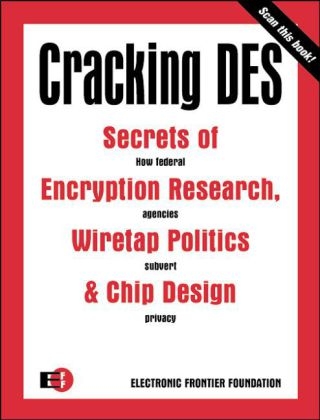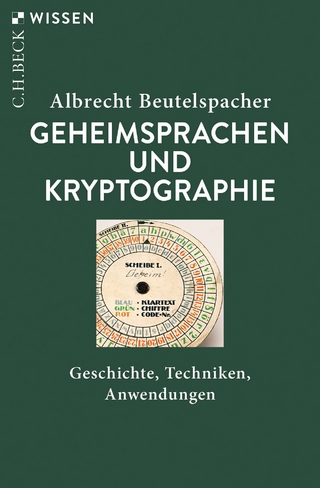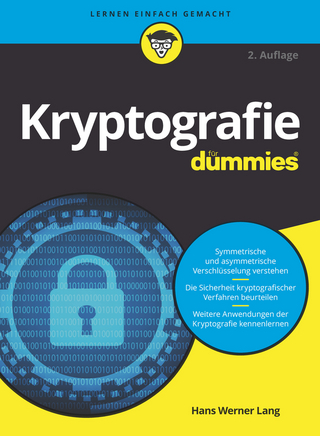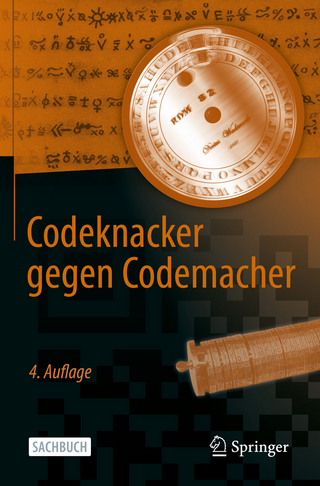
Cracking Des
O'Reilly Media (Verlag)
978-1-56592-520-5 (ISBN)
- Titel ist leider vergriffen;
keine Neuauflage - Artikel merken
Sometimes you have to do good engineering to straighten out twisted politics. The Electronic Frontier Foundation, a nonprofit organization that was founded to ensure that the principles embodied in the Constitution and Bill of Rights are protected as new communications technologies emerge, and O"Reilly, the premier publisher of computer and computer-related books, team up to produce Cracking DES: Secrets of Encryption Research, Wiretap Politics & Chip Design. By doing this they have exploded the government-supported myth that the Data Encryption Standard (DES) has real security. National Security Agency and FBI officials say our civil liberties must be curtailed because the government can't crack the security of DES to wiretap bad guys. But somehow a tiny nonprofit has designed and built a $200,000 machine that cracks DES in a week. Who's lying, and why? This book reveals full technical details on how researchers and data-recovery engineers can build a working DES Cracker. It includes design specifications and board schematics, as well as full source code for the custom chip, a chip simulator, and the software that drives the system. The U.S. government makes it illegal to publish these details on the Web, but they're printed here in a form that's easy to read and understand, legal to publish, and convenient for scanning into your computer.
The Data Encryption Standard withstood the test of time for 20 years. This book shows exactly how it was brought down. Every cryptographer, security designer, and student of cryptography policy should read this book to understand how the world changed as it fell.
The Electronic Frontier Foundation was founded in July of 1990 to ensure that the principles embodied in the Constitution and Bill of Rights are protected as new communications technologies emerge. To this end, the EFF: Sponsors cases such as the CDA, Steve Jackson Games, and Bernstein v. Department of State and NSA cases, in which users' online civil liberties have been violated. Additionally, EFF submits amicus briefs and finds pro bono counsel when possible for important legal cases. We continue to monitor the online community for legal actions that merit EFF support. Works to ensure that communications carriers do not deny service to network users solely on the basis of the content of their messages and that carriers do not bear undue liability for harm stemming from the content of messages where that harm is actually caused by users. Produces legal white papers informing BBS operators, telephone companies, and public utility commissions about the civil liberties implications of their actions. We monitor legislation and agency actions affecting the online community. We also work with EFF members and groups of members on state and local levels to affect change in local legislation. Provides a free telephone hotline for members of the online community who have questions regarding their legal rights. Speaks to law enforcement organizations, state attorney bar associations, conferences and summits, and university classes on the work that we do and how these groups can get involved.
Foreword Preface Chapter 1. Overview Politics of Decryption Goals History of DES Cracking EFF's DES Cracker Project Architecture Who Else Is Cracking DES? What To Do If You Depend On DES Conclusion Chapter 2. Design for DES Key Search Array On-Chip Registers Commands Search Unit Operation Sample Programming Descriptions Scalability and Performance Host Computer Software Glossary Chapter 3. Design for DES Key Search Array Chip-Level Specification ASIC Description Board description Read and Write Timing Addressing Registers All-active Signal ASIC Register Allocation Chapter 4. Scanning the Source Code The Politics of Cryptographic Source Code The Paper Publishing Exception Scanning Bootstrapping Chapter 5. Software Source Code Chapter 6. Chip Source Code Chapter 7. Chip Simulator Source Code Chapter 8. Hardware Board Schematics Board Schematics Sun-4/470 backplane modifications PC Interfaces Errata Chapter 9. Breaking One Million DES Keys by Yvo Desmedt Abstract Introduction The basic idea Details of such a machine Obtained results and remarks Conclusion Acknowledgement Chapter 10. Architectural Considerations for Cryptanalytic Hardware Abstract Introduction Motivation Related work Technical Approach Design and Analysis Future work Conclusions Acknowledgements Availability References Chapter 11. Efficient DES Key Search--An Update by Michael J. Wiener Advancing Technology Programmable Hardware Conclusion Chapter 12. Authors The Electronic Frontier Foundation John Gilmore Cryptography Research Paul Kocher Advanced Wireless Technologies
| Erscheint lt. Verlag | 4.8.1998 |
|---|---|
| Zusatzinfo | Illustrations |
| Verlagsort | Sebastopol |
| Sprache | englisch |
| Maße | 178 x 232 mm |
| Gewicht | 450 g |
| Einbandart | kartoniert |
| Themenwelt | Informatik ► Theorie / Studium ► Kryptologie |
| ISBN-10 | 1-56592-520-3 / 1565925203 |
| ISBN-13 | 978-1-56592-520-5 / 9781565925205 |
| Zustand | Neuware |
| Haben Sie eine Frage zum Produkt? |
aus dem Bereich


